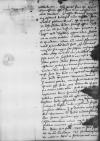List #2434
Cornelis DE SCHEPPER do Ioannes DANTISCUSBrussels, 1541-06-12
Regest polski:
De Schepper, jak już wcześniej sygnalizował Dantyszkowi [IDL 2413], z pewnych względów nie został wezwany przez cesarza na sejm w Ratyzbonie. Otrzymuje stamtąd niepewne, a nawet sprzeczne wiadomości, toteż nie może odpowiedzieć na pytania Dantyszka. Żałuje, że nie miał okazji do rozmowy z posłem króla Polski [Stanisławem Maciejowskim], o którym pisał mu Dantyszek, jako o osobie przyjaznej. Ubolewa, że nie ma obecnie na dworze cesarskim nikogo, z kim mógłby otwarcie rozmawiać, gdyż dawni znajomi albo umarli, albo wyjechali. Godschalk [Ericksen], bracia Wolfgang i Bartholomeus Haller oraz Miklos Oláh zostali wysłani przez królową Marię do jej posiadłości na Węgrzech. [Nicolas Perrenot de] Granvelle przyjął do kancelarii cesarskiej ludzi wprawdzie uczonych i uczciwych, lecz zupełnie niedoświadczonych. Donieśli oni z Ratyzbony, że wszędzie panuje spokój, że stany niemieckie wyślą armię na Węgry, i że Buda została już zdobyta. De Schepper chciałby, aby była to prawda. Arcybiskup Lundu [Johan Weze] przebywał w Lubece, gdzie długo chorował, a następnie w Waldsassen, w opactwie Cystersów, którego jest opatem. Stamtąd został ostatnio wezwany przez cesarza do Ratyzbony.
De Schepper wyraża się z aprobatą o charakterze (ingenium amoenissimum) i talentach poetyckich młodego podopiecznego Dantyszka, Eustachego Knobelsdorffa. Zawiadamia, że Knobelsdorff odwiedza go rzadko z powodu nieobecności dworu królowej [Marii], a wraz z nim De Scheppera w Brukseli. Królowa przybyła tam dopiero w maju i pozostanie do zaślubin córki króla Danii, Christiny z Franciszkiem, synem księcia Lotaryngii.
De Schepper oczekuje na sukces sejmu w Ratyzbonie i oblężenia Budy. Dowiedział się, że wśród obrońców są Polacy, co wydaje mu się prawdopodobne ze względu na sytuację królowej wdowy Izabelli [Jagiellonki]. Sukces obrony zależy od posiłków tureckich, los oblężonych jest zatem przesądzony niezależnie od tego, kto zwycięży – albo dostaną się pod władzę oblegających [tj. króla Ferdynanda], albo Turków. Turcy nie powtórzą błędu Ibrahima Paszy, który niegdyś podsunął sułtanowi pomysł przekazania Budy królowi Janowi [Zapolyi].
Żona i córka De Scheppera polecają się Dantyszkowi. De Schepper pozdrawia Dantyszka oraz jego braci i siostry.
| odebrano Heilsberg (Lidzbark), 1542-03-22 Rękopiśmienne podstawy źródłowe:
Pomocnicze podstawy źródłowe:
Publikacje:
| ||||||||||||||
Tekst + aparat krytyczny + komentarz Zwykły tekst Tekst + komentarz Tekst + aparat krytyczny
Reverendissimo et excellentissimo Praesuli orig. Presuli⌈PraesuliPraesuli orig. Presuli⌉ et Domino, domino
In
Reverendissime Praesul orig. Presul⌈PraesulPraesul orig. Presul⌉, domine et pater honorandissime et observandissime.
Post ultimas cf.
Scribis ad me, ut certiorem te faciam de iis, quae in
Illustris  AAWO, AB, D. 6, f. 45v
quippe qui tuo exemplo libenter me componerem ad quietem, si ulla tamen ha paper damaged⌈[a]a paper damaged⌉beri in hac vita potest, sed usuvenit nobis, quod iis solet, qui ex magna tempestate maris erepti in litore orig. littore⌈litorelitore orig. littore⌉, ubi salutem exspectabant, in alia incidunt incommoda. Ita, si quando ex aulica vita pedem extricare paramus, obversantur animo mille aliae facies turbationum adventurarum.
AAWO, AB, D. 6, f. 45v
quippe qui tuo exemplo libenter me componerem ad quietem, si ulla tamen ha paper damaged⌈[a]a paper damaged⌉beri in hac vita potest, sed usuvenit nobis, quod iis solet, qui ex magna tempestate maris erepti in litore orig. littore⌈litorelitore orig. littore⌉, ubi salutem exspectabant, in alia incidunt incommoda. Ita, si quando ex aulica vita pedem extricare paramus, obversantur animo mille aliae facies turbationum adventurarum.
cf.
Principio tirones illi magna et speciosa scripsere ex aula, pacata scilicet omnia, quod maxime optandum, non spem solum verum orig. vaerum⌈verumverum orig. vaerum⌉ et certitudinem esse certissimam,
 AAWO, AB, D. 6, f. 46r
celebrabuntur, iisque peractis fama est
AAWO, AB, D. 6, f. 46r
celebrabuntur, iisque peractis fama est
Successum
Quod ad me attinet, experientia docuit quam minimum fidei ut
 AAWO, AB, D. 6, f. 46v
AAWO, AB, D. 6, f. 46v
Eiusdem Reverendissimae Dominationis Vestrae humilis et addictissimus filius



